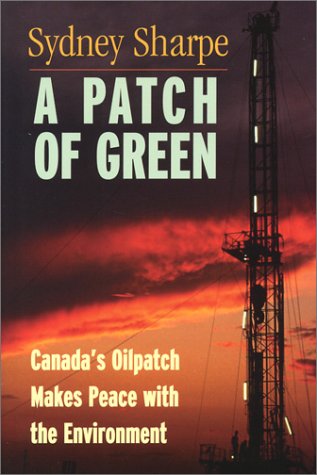A Patch of Green: Canada's Oilpatch Makes Peace with the Environment - Softcover

"synopsis" may belong to another edition of this title.
As the national quarrel over the Kyoto Protocol escalates, no industry is under more critical scrutiny than oil and gas. The petroleum business is blamed for exploiting fossil fuels, polluting the land and air where it operates, causing the greenhouse gas problem, and generally contributing to global warming. Many Canadians seem to believe that if oil and gas companies are forced to curb their excesses, the climate itself will be cured.
Most of the criticism is false, or at least wildly exaggerated, but there’s ntohing new about it. In 1994, when I started writing about oil and gas as Clagary bureau chief of the Financial Post, I realized almost immediately that the industry was a handy punching bag for a whole bundle of hostile interests.
Yet the reality of the business failed miserably to fit its sterotype. The "oilpatch," as it’s commonly called, was full of rambunctious characters who were frankly out to get rich, but who knew that a new set of rules had emerged. No longer could the environment be causally pillaged as it had been in the days when oil companies (and most other industrial businesses) didn’t worry about the mess they left behind. Modern oil companies are much more careful with their neighbours, with Aboriginals, and with the air and water around their operations. Some companies and employees enthusiastically embrace the new ethic. Others follow along because they know the risks of flouting laws and public opinion, but follow they do.
After Kyoto was endorsed by the Canadian government in 1997, and the slow march to ratification began, the industry lauched another wave of environmental action and rapid improvement. With surprising speed, a creaky old industry had modernized both its mind and its machinery, and roared past many others toward the millennium. Today the Canadian oilpatch can boast of remarkable advance in environmental technology and practice, and in its deaings with many interest groups. Critical but knowledgeable environmentalists admit they’re impressed, almost in spite of themselves.
Yet the public’s awareness of these changes lagged far behind the reality all through the 1990s. It still does today. The oil and gas business is portrayed in many media as an uncaring polluter with no regard for the environment. Part of this attitude stems from ignorance about what the companies and regulators are actually doing. More of it grows from the ideological conviction that no matter how clean the industry becomes, it still has no right to exist because it uses fossil fuels. For these opponents, it is legitimate to try to discredit the industry on the slimmest pretext. What’s more, blunders and arrogance on the part of some international oil companies, such as Exxon in Alaska and Royal Dutch/Shell in Nigeria, have done the rest of the industry no good. Yet these companies have also shown that they can change for the better.
In Canada, the Wiebo Ludwig affair became the focus of vitriolic anti-industry sentiment in the late 1990s. Even though Ludwig’s charges of environmental and health damge were contradictory and unsupported by evidence, his story was swallowed whole by many Canadians. His criminal convictions related to bombings seemed to make little difference to this perception. The targets of bombings – the companies and people who worked for them – somehow became the villains.
The obvious unfairness of this situation nudged me toward writing this book. Later, the promise of cooperation from environmentalists, Aboriginals, academics, regulators, and key industry leaders made me determeind to do it. My brief time working in a senior position at an integrated oil company gave me valuable insight into the seriousness with which concerned companies tackle environmental challenges.
I’ve tried to set out a clear picture of how the industry handles emissions, pollution and social concerns, both in Canada and abroad. The inescapable conclusion is that, while problems remain, the successes are remarkable.
Environmental scientists are convincing the companies that employ them to make projects green and clean, or to abandon them entirely. Executives who were once casual polluters have become avid environmentalists. Native leaders explain how an industry that once ignored or exploited them now takes their concerns seriously, bringing benefits to their people and communities. Industry leaders show how their opposition to the Kyoto Accord is consistent with both environmentalism and sound economics. And the people who live near Wiebo Ludwig finally get to tell their side of the story, which directly contradicts his.
Radical critics of the industry may find this book challenges their beliefs. As always, facts can be inconvenient to dogma. That dilemma is theirs to ponder; my role is simply to set out the evidence.
"About this title" may belong to another edition of this title.
- PublisherKey Porter Books
- Publication date2002
- ISBN 10 1552635201
- ISBN 13 9781552635209
- BindingPaperback
- Number of pages240
Buy New
Learn more about this copy
Shipping:
US$ 12.58
From United Kingdom to U.S.A.
Top Search Results from the AbeBooks Marketplace
A Patch of Green: Canada's Oilpatch Makes Peace with the Environment
Book Description Paperback. Condition: Brand New. 240 pages. 8.80x6.00x0.80 inches. In Stock. Seller Inventory # 1552635201

